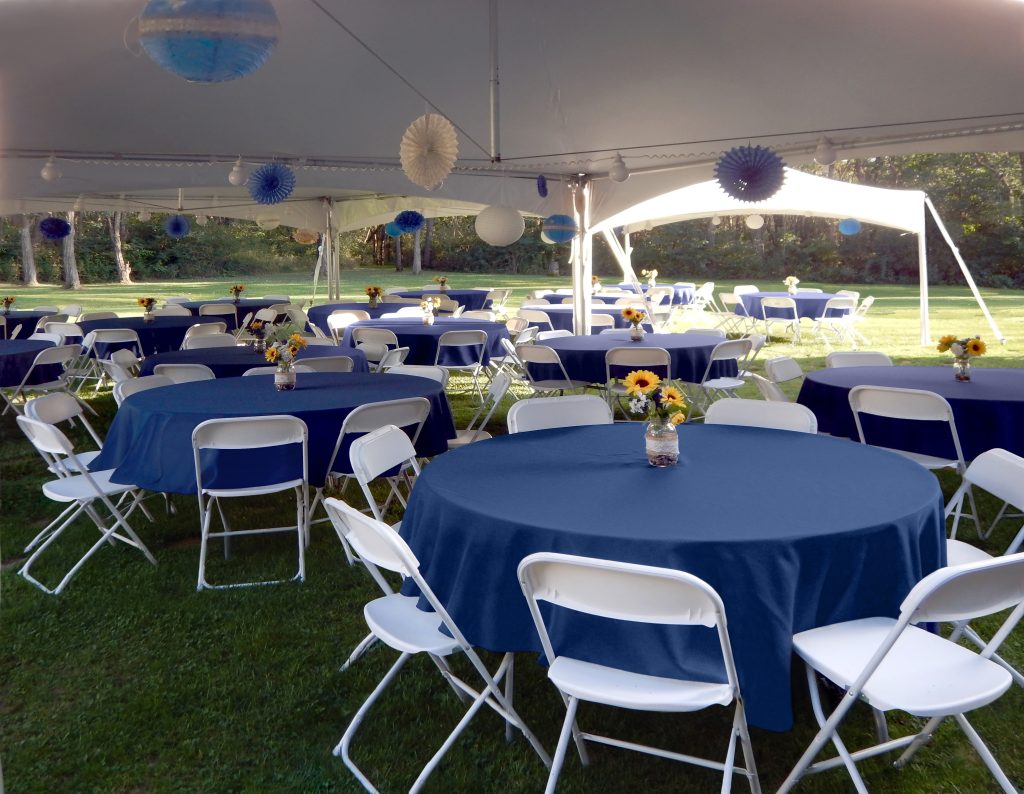Folding tables are a versatile form of furniture perfect for marquee parties, pop-up events, and catering to overflows. If you’re looking to choose folding tables for your next occasion, you may find the variety overwhelming. Read on to find out all about folding tables and make your decision easier.
What is a folding table?
A folding table is a lightweight version of a regular desk or table. Typically, the legs and stays will fold up against the bottom of the tabletop to make the item compact for storage and transportation. The tabletops themselves don’t usually fold up – they’re not the same as drop leaf tables either. You can get folding chairs to make seating arrangements easy too.
Types of folding tables
Folding tables can vary in several different ways: size, shape and material. For this reason, they are suitable for a wider range of uses than regular tables – particularly for events that often change location or require furniture to be moved. Here’s how some of the different types of folding tables can be put to purpose:
- Square folding tables – often used as two-seater tables both inside and outside cafés. These can be put together to make bigger tables if necessary, but are ideal for venues where space is limited.
- Rectangular tables – great for serving buffets and displaying stock. Rectangular tables can be put together end to end to form long banquet tables, or side by side to make large square tables for meetings and conferences.
- Round tables – for dinner events and evening dos. These large round tables allow for free-flowing conversation between tables, with plenty of space in between to give waiting staff ease of access.
How do folding tables work?
To keep your folding table in good condition, it’s important to use it properly. Some folding tables are stackable once folded, but you should always check this when purchasing as they could be damaged if they slip or fall as a result of improper storage. If your folding tables don’t stack, they can be stored upright against a wall instead.
How to open a folding table
Opening a folding table is usually straightforward. If you stand the table on one end, you should be able to pull the legs away from the tabletop to extend them. Then you should fasten the locking mechanism. This can be found on one or both of the legs, depending on the design, and is what stops the table from folding once you’ve set it up.
Always check that the locking mechanism is working correctly before loading the table with items. If the lock hasn’t clicked into place properly, the table could collapse when weight is applied. A simple way of doing this is to press down on the tabletop. Do this carefully – if the table does collapse it may get damaged.
How to fold a folding table
Once you’ve taken everything off your folding table, there are two important things to remember when attempting to fold it back up. Firstly, you should stand the table up on one end to fold the legs up into the tabletop. Do not collapse the legs while the table is still standing on them – this could damage the table.
Secondly, always remember to release the locking mechanism before you collapse the legs. The legs shouldn’t move with the locking mechanism engaged – if you try to move them by force, you could risk damaging both the legs and the locking mechanism.
How much weight can a folding table hold?
Folding tables can often hold far more weight than you might expect – but this doesn’t mean that you should test their limits. Although folding tables are designed to be durable, you should try not to use them for things they’re not intended for. This means they shouldn’t be used as seating, as it could put a strain on the legs and joints of the table and cause damage.
For most uses, though, folding tables can carry more than enough weight. They’re sturdy and durable enough for catering, buffets, events and more. For the best results, always load weight evenly on the tabletop, as this should help to prevent overbalancing or slipping.
Benefits of folding tables
You may be wondering whether folding tables are any better for your event or occasion than more permanent, regular tables. While there are benefits to each type of table, folding tables are often better for temporary use.
Here are some of the other benefits of folding tables:
- Storage – as they fold away, folding tables take up far less space in storage.
- Transport – folding tables are usually lighter than regular tables, so they’re easier to move around. Because of this, they allow your space to be used for a variety of different events – it’s no trouble to move the tables aside to create a dance floor or performance space.
- Outdoor-friendly – with simple, wipe clean surfaces, folding tables can be used both indoors and outside, making them perfect for events such as craft stalls, open days, and festivals.





